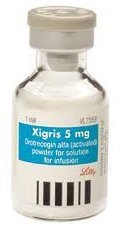 |
Honour and integrity has prevailed! The PROWESS-SHOCK trial of Drotrecogin Alpha (activated) in septic shock has been published in this week’s NEJM. It is a significant negative trial and fair play for not burying it (See ICN Reviews – The PROWESS of Xigris gets SHOCKed). PROWESS was a MC-DB-PC-RCT published in 2001 and demonstrated a 6% absolute reduction in 28-day all-cause mortality in patients with severe sepsis (infection + SIRS + MOF). The greatest benefit was seen in the sickest patients, with an APACHE-II > 24. But almost immediately there were concerns.
So Marco Ranieri and his group set about evaluating the role of Drotrecogin Alpha in the sickest PROWESS population, which is the PROWESS-SHOCK trial. |
In summary, the trial has failed to demonstrate any difference in all-cause mortality at 28 or 90 days, or in any of the pre-defined sub-group analyses. About the only positive so far is that there was also no difference in incidence of serious bleeding.
So far the trial is being praised as pretty robust, but as predicted, the spectres of sample size and powering are raising their ghoulish claws. It boils down to the population definitions (severe sepsis versus septic shock) and the estimates of sepsis-attributable and all-cause mortality. Read the accompanying editorial for a good explanation of the issues.
Eli-Lily, the product manufacturer, withdrew Drotrecogin Alpha (Xigris) from the shelves several months ago, which has been lamented by many in the critical care community, as there is belief that there are still roles for this medication in specific contexts; such as DIC in meningococcal sepsis. Whether we will ever see it back on the shelves again in the near future, however, for the moment seems very doubtful.
























